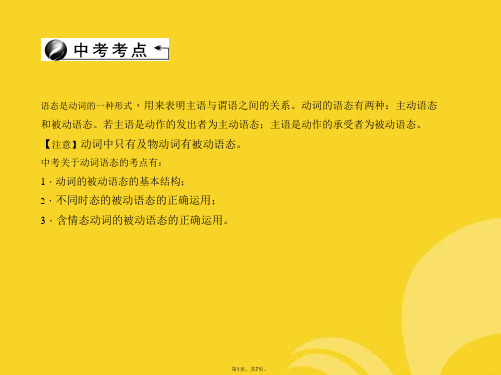中考英语备考:英语二轮复习——第2讲、动词分类与谓语动词(讲义含答案)
(通用版)2019中考英语二轮复习 动词讲义

A can’t Bmustn’t C shouldn’t D needn’t
17. It ________ be fantastic if more students join in the charity show tomorrow.
13. You have already tried your best, so you ________ worry too much about the exams.
A. can't B. needn't C. mustn't D. shouldn't
14. Only you ________ do such a thing, I'm sure, and nobody else has such an ability.
A. mustn'tB. shouldn't C. needn't D. can't
4. Passengers ______ stay seated during the take-off and landing.
A) canB) mayC) shouldD) must
5. Computers __________solve many difficult problems quickly.
动词
学员姓名:年级:辅导科目:英语学科教教学内容
课前回顾
知识梳理
知识点1:动词
I.动词的定义:动词是表示动作或状态的词。例如:work,工作, study,学习,eat吃。
II.动词的分类:
中考英语二轮复习 语法专题情态动词 (讲义)

初三英语中考二轮复习【语法专题】情态动词中考考点用法点睛(讲义)He can speak English.翻译:他可以说英语。
情态动词:在表达说话人的情感或态度的一类动词。
特点:1.情态动词不能单独做谓语,必须与其他动词一起构成谓语。
2.情态动词后必须跟动词原形。
3.情态动词具有助动词功能。
常见的情态动词can/could可以,能够may/might也许,可能;must必须/need需要/dare敢于/should应该/would打算He can speak English.他可以说英语。
表示能力,能够做某事。
She can swim fast.They can play basketball well.Lucy can help you with this.【be able to】能够做某事,can表示能力的时候,他们2者之间,能够相互替换She is able to swim fast.They are able to play basketball well.Lucy is able to help you with this.He could write poems when he was 10. 翻译:他十岁时会写诗。
过去能够做某事,用,could来将其替换He could write poems when he was 10. 他十岁时就会写诗。
I could swim when I was seven years old. 我七岁的时候会游泳。
Leo could run fast when he was young. 利奥年轻的时候跑得很快。
在疑问句当中could 作为引导词出现——表达委外语气,请求做某事。
Could I have a drink我可以喝一杯吗?肯定回答只能用——Yes,you can. Could we meet again next week下周我们可以再见面吗?——Yes,we can.Could I come to see you tomorrow明天我能来看您吗?——Yes, you can.This news can't be true.翻译:这个消息不可能是真的。
人教版中考英语二轮动词和动词短语课件

考点精讲
Hale Waihona Puke 5. Our school has ot a mobile”.
a sign at the gate, saAying “Greet your child with a smile, n
A.put up B.put off C.put on
6.I asked my father to
me
Aat the school gate at 6:30 so that we could
14
考点精讲
②及物动词+副词 find out,give up,look up (查找),put on,pick up,ring up,take off (脱下), take away,turn on,turn off,think over,cut off ③不及物动词+副词 get up,go on,grow up,set off,stand up,take off ④动词+副词+介词 get on (along) with,catch up with,come up with,go on with,look forward to ⑤动词+名词+介词 take part in,make friends with,take care of
4.(2019湖北武汉,36)—Have you D chemistry for the coming exam? —Yes. I'm quite ready for it. A.repeated B.copied C.marked D.reviewed 5.(2019内蒙古呼和浩特,3)—Jack, let's have a picnic after school. —Sorry. I have D Frank to work on the biology report with him. A.advised B.expected C.suggested D.promised
中考英语第二轮语法考点聚焦第讲动词的语态(与“动词”相关文档)共7张PPT

—Thank yoTuh. e woolen sweater costs $88.这件羊毛衫卖88美元。
房间已经被打扫干净了。
2.不同时态Th的e被ca动r 语ne态ed的s正re确pa运ir用in;g.=The car needs to be repaired.那辆车需要修理。
He made the boy work for him.=The boy was made to work for him.这男孩被迫为他工作。
③动词短语变成被动语态时,动词短语后面的介词或副词不能省略。如:
The baby was looked after by her sister.这婴儿由她姐姐照顾。 His plan was laughed at by everyone.他的计划遭到每个人的嘲笑。
3.含情态动词的被动语态的正确运用。
—Thank yoTuh. e soup tastes delicious.这汤尝起来味道很好。
第3ቤተ መጻሕፍቲ ባይዱ,共7页。
②主动语态中有些动词(如:make,see,listen,watch,feel)后常跟不带to的动词不定式作宾语补足 语,变为被动语态要带上to。如:
The book is worth reading.这本书值得一读。
第5页,共7页。
一、用括号中所给词的适当形式填空。(原创) isn't allowed 1.Don't smoke here, Dad. Smoking ____________a_r_e_s(eanlltow) in public places. 2.Some students in this school _____________(send) abroad as exchange students every year. 3.Pukou Railway Station _____________(build) in 1911 and it has become a filming location for films
2024中考英语二轮复习舍我其谁话动词

舍我其谁话动词一、提分关键1.牢记易混搭配remember doing sth. 记得做过某事remember to do sth. 记得去做某事(未做)forget doing sth. 遗忘做过某事forget to do sth. 遗忘去做某事(未做)stop doing sth. 停止做某事stop to do sth. 停下来去做某事need doing sth. 须要做某事(被动含义)need to do sth. 须要去做某事(主动含义)try doing sth. 尝试做某事try to do sth. 尽力做某事hear/see sb doing sth. 听见/望见某人正在做某事hear/see sb do sth. 听见/望见某人做了某事2.明确动副结构短语的用法“动词+副词”结构的短语,当宾语是名词时,既可放在动词和副词中间,又可放在副词后面;宾语是代词it或them时,只能放在动词和副词中间。
get back, put on, take off,turn on, pick up, try on, look up,wake up,put up, put away, give up.3.驾驭非谓语动词的用法初中阶段考试的重点:动词不定式作宾语、宾语补足语、后置定语、主语和目的状语等;动名词作宾语和主语。
真题回访1. I will meet Jane at the station. Please _________what time she will arrive.A. countB. chooseC. checkD. catch2. The local people like that Italian restaurant because it ________ both delicious food and good service.A. usesB. wantsC. sharesD. provides3. I really enjoy the noodles and vegetables. They __________delicious.A. stayB. feelC. tasteD. sound4. “Did you borrow the comic book from the library?”“Yes, I ____________ it for three days. I’ll return it this afternoon.”A. borrowedB. keptC. have borrowedD. have kept5. Many teenagers __________the old and they often offer their seats to the old on buses.A. agree withB. worry aboutC. laugh atD. care for6. When he saw a wallet on the playground, he __________at once.A. picked it upB. gave it upC. picked up it7. The great writer has written many stories for children. It is said that a new one will ______at the end of this month.A. go outB. come outC. look outD. run out8. The retired couple enjoy __________ photos. They always go out with their cameras.A. takeB. tookC. to takeD. taking9. The children decide ________ their school yard this Friday afternoon.A. cleanB. to cleanC. cleaningD. cleaned10. I haven’t decided when __________ a holiday yet.A. tookB. takingC. to takeD. take11. ________honest is the first thing people should learn.A. BeingB. LookC. BeD. Become12. All the Chinese people must work hard __________ China Dream.A. to realizeB. realizeC. realizing13. I always tell my students _________ on the road because it’s really dangerous.A. not to playB. to play notC. not playingD. not play14. Seeing their teacher ________ into the classroom, they stopped ______at once.A. walk; tellingB. entering; to speakC. enter; to tellD. walking; talking中考命题大预料1.All kinds of flowers __________ a pleasant smell in spring.A. inventB. discoverC. buildD. produce2. ---Dinner is ready. Help yourself!--Wow! It ________ delicious. Could you please tell me how to cook it?A. tastesB. looksC. soundsD. feels3. The pants looks beautiful. Can I ____________?A. try on itB. try on themC. try it onD. try them on4. I know a right choice usually _________ to success and happiness.A. leadsB. happensC. getsD. agrees5. ---What should I do?--- Never __________ your dream.A. get upB. give upC. think upD. wake up6. Tickets, please. May I ___________ your ticket please, madam?A. showB. watchC. findD. see7. ---How are you __________ your friends?---- Very well. They are very friendly.A. catching up withB. getting on withC. looking forward toD. going on with8. It’s very hot here. Why not _________ your coat?A. take outB. take offC. take awayD. take down9. They _________the sports meeting because of the heavy rain.A. put offB. put downC. put onD. put away10. ---Why couldn’t you ___________ the correct spelling of the word?----I hadn’t got a C hinese-English dictionary at hand.A. look forB. look downC. look upD. look at11. He __________ a new school to give free education to poor students.A. cleaned upB. set upC. fixed upD. ended up12. Kate d idn’t go to the movies last night because she had to ______ her sick dog at home.A. look atB. look upC. look forD. look after13. When you try to ___________ a crying child, you can make faces.A. wake upB. cheer upC. give upD. stay up14. Can you tell me __________ the computer?A. how to useB. how usingC. what to useD. what using15. The teacher told her students __________ in public.A. not to shoutB. didn’t shoutC. not shoutD. to not shout16. ________an English club is good for your spoken English.A. JoiningB. JoinC. JoinedD. Joined in参考答案真题回访1-5 CDCDD 6-10 ABDBC 11-14 AAAD中考命题大预料1-5 DADAB 6-10 DBBAC 11-16 BDBAAA。
中考英语二轮专题复习课件:语法专项复习之动词(共23张PPT)

大多数动词直接加“S”在清辅音后发音为[s],在浊辅 音及元音后发音为 [z]。 2.teach-teaches [iz]; watch-watches [iz] 以“s, x, ch, sh”结尾的,在词尾加“es”,发音为[iz] 3.fly-flies [z]; carry-carries [z] study-studies [z] 以辅音字母加“y”结尾的,变y为i,加“es”读[z] 4.go-goes [z] do-does [z]
1.My mother often _s_p_e_n_d_s_lots of time reading books. 2.It _ta_k__es_me half an hour to swim every day. 3.Neither his mother nor his father__p_a_y_s_for his iphone. 4.Everything _c_o_s_t_s__us money. (take,spend,cost,pay)
中考复习之语法专项
动词
2
1
中考考点:
1.动词词义辨析。 2.动词短语辨析。 3.动词分类中系动词、助动词和情态动词。 4.动词分类中及物动词和不及物动词、延续 性动词和非延续性动词。
5.动词的时态、语态。 6.非谓语动词即动词不定式和动名词。
2
2
学习目标: 1.辨析、理解、运用易混动词。 2.掌握动词第三人称单数、动词ING形式、动词 过去式、过去分词的构成及用法。 3.课下通过练习巩固总结动词短语。
完成句子
1.Mr.Wu is going to _s_p_e_a_k_at our class meeting. 吴老师将在班会上发言。 2.Look!Our teacher is t_a_l_k_in_g_ to(with)theparents. 瞧!我们的老师正在和家长们谈话。 3.Kate saw a card on her table,it _sa_i_d:“Happybirthday!” 凯特看见桌上一张卡片,上面写着:“生日快乐!”
- 1、下载文档前请自行甄别文档内容的完整性,平台不提供额外的编辑、内容补充、找答案等附加服务。
- 2、"仅部分预览"的文档,不可在线预览部分如存在完整性等问题,可反馈申请退款(可完整预览的文档不适用该条件!)。
- 3、如文档侵犯您的权益,请联系客服反馈,我们会尽快为您处理(人工客服工作时间:9:00-18:30)。
中考英语二轮复习——第2讲、动词分类与谓语动词(讲义含答案) 中考二轮复习——第2讲、动词分类与谓语动词(讲义) 【知识点睛】 一、动词种类
__________________________________________________________________________________________________________________________________________________________________________
动词________________________________
情态动词用法: 没有人称和数的变化; 不能单独作谓语,后面必须接动词原形构成谓语部分; 变否定,情态动词后直接加not; 变疑问,情态动词直接提前。 can & could 表_________ He can speak English. He could ride a bike when he was 7. He is so young that he can’t look after himself. He couldn’t write when he was only 2. I will be able to speak German fluently someday. 表_________ Can you pass me some paper? Could you please tell me where the bookstore is? You can go now. 表_________ —Who is singing in the next room? Is it Lucy? —It can’t be her. She has gone to New York. may & might 表_________ —May I know your name? —Might I know your name? —Yes, you __________. —No, you __________. You may go now. 表__________ She may know the answer, but I’m not sure. —Have you decided where to go for your weekend? —Not yet. We may go to Qingdao. must & have to ___________ The movie is boring. I must go now. Drivers must wear the safety belt when driving. This is the traffic rule. My mother called me. I have to go now. —Dad, must I practice the piano today? —Yes, you _______. —No, you ______./ No, you don’t have to. You may do it tomorrow. ___________ You mustn’t nip off the flowers. You don’t have to be in a hurry. (没必要) 表_________ —Whose notebook is this? —It must belong to Tom. I saw he used it just now. He must have known the truth. need ___________ You need not get here early. —Need I repeat it? —Yes, you ______./ No, you _______. ___________ She needs a dictionary to help her study. I need to make a phone call. The room needs cleaning. 情态动词表推测——一肯,一否,三个不一定 —Whose notebook is this? —It must belong to Tom. I saw he used it just now. —Who is singing in the next room? Is it Lucy? —It can’t be her. She has gone to New York. She may/might/could know the answer, but I’m not sure. 情态动词+现在完成时 1、表对过去的猜测、可能性 ①must have done“一定做了…”用于肯定句,语气最强。 The light is off. He must have slept. ②may/ might have done可能做了…,语气弱,可能性小。其否定式意为“可能不…”,如:He might not have been in. 他可能不在家。might比may可能性更小。 ③can (could) not have done“不可能做了…”,语气强,can, could也可用于疑问句,表可能性,如:Could he have left? 2、表示虚拟语气,与过去事实相反,“本来应该”而“没有…”。 ①should (ought to) have done. 本来应该做,而没做到 如: You should have asked him for help. (事实上没求他帮忙) ②could have done 本来能够…,如:He could have passed the exam. (结果没通过) ③might have done 本来可以… ④needn’t have done 本来没必要… You needn’t have taken a taxi. It is not far. (事实上坐出租车了) ⑤had better have done sth. 用于事后的建议,含轻微的责备的口吻,意为“当时最好做了某事”。 ⑥表示would rather have done sth.“当时宁愿做了某事”,表示“后悔”的意思。 should, ought to, could, might, had better, would rather也可用于否定句式,意思与上述在肯定句中的意思正好相反。
二、时态 (一)时态分类 ________________________________________________________________________________________________________________________________________________________________________________________按分________________________________
(二)各个时态的用法(详细用法请参考附录1) 一般现在时:反复性 规律性 经常性、客观事实真理、主将从现 一般过去时:过去的动作或状态、过去经常或习惯 一般将来时:将来的动作或状态、计划打算、现进表将来 过去将来时:从过去某一时刻看将来、主过从过(would + v.) 现在进行时:此时此刻、现阶段 过去进行时:过去某一时刻(段)正在进行、过去频繁发生 现在完成时:过去发生影响现在、过去发生持续现在将来 过去完成时:过去的过去 —____the film before? —Yes. I ___it the day before yesterday. A. Have you seen; saw B. Did you see; have seen C. Have you seen; have seen D. Have you seen; was seeing
(三)易混时态区分:一般过去时VS现在完成时 一般过去时 现在完成时 侧重点 过去的时态; 侧重表示过去的动作,与现在无关 现在的时态; 侧重过去的动作对现在的影响
例句 I saw a movie last night. 强调昨晚上看电影的动作 I have seen the movie before. 强调我了解电影内容
时间状语 ago, yesterday, last…, in 2000, just now等 before, already, yet, so far, ever, never, just, recently, since, for, lately, still等 (不能与一般过去时的时间状语连用)
—___________(see) the film the day before yesterday ? —Yes, I _____________(see) it already. It is really interesting. (四)完成时态中瞬间动词变延续性动词汇总 瞬间动词_______(有/无)现在完成时用法;当瞬间动词用于现在完成时中,并与__________连用时,需要将瞬间动词转换成相应的延续性动词 —Your sister looks very happy! —Yeah, she has finally bought the dress she wants most. —Wow, your watch looks nice. Is it new? —No, I _________ (buy) it since 3 years ago. 将下列瞬间动词转换为相应的延续性动词: close __________ come __________ go __________ finish __________ die __________ put on _________ lose __________ join __________ get up _________ buy __________ borrow _________ open __________ leave __________ fall asleep __________ wake up __________ arrive/reach __________ start/begin __________ catch a cold __________
